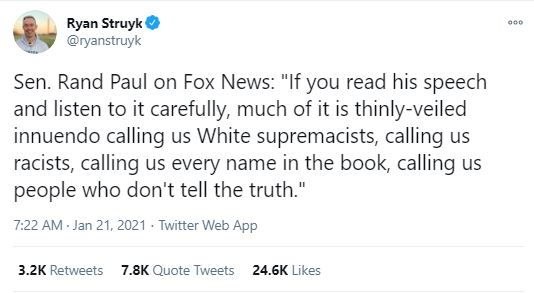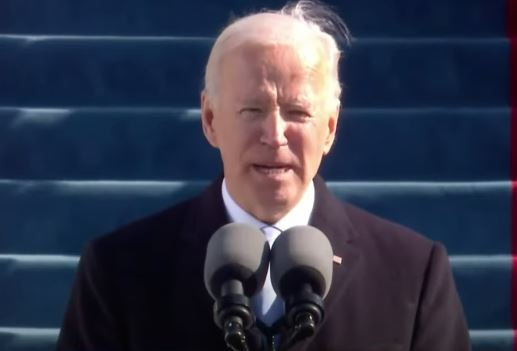Joe Biden took the oath as the 46th President of the US on Wednesday, January 20. In his inaugural address, Biden said 'we will defeat' white supremacy and extremism. But Republican Kentucky senator Rand Paul noticed insult in the President's speech.
According to a tweet by CNN's Ryan Struyk the senator told Fox News: "If you read his speech and listen to it carefully, much of it is thinly-veiled innuendo calling us White supremacists, calling us racists, calling us every name in the book, calling us people who don't tell the truth."

He also expressed his concerns regarding the impeachment of former President Donald Trump on Wednesday. According to Senator Paul, he fears that Republicans will destroy the party if they support Trump's conviction during the Senate trial. "Donald Trump isn't everything in the party but he did bring a lot of people to the party," he said.
The Inaugration Speech
Biden took the oath of office from Supreme Court Chief Justice John Roberts at a solemn ceremony at the West Front of the Capitol, which is the traditional location for presidential inaugural ceremonies. At the time when the nation is widely divided, in the rare inaugural speech, Biden denounced the racism, nativism, demonization and fear that prompted the Capitol riot on January 6 by violent Trump supporters.
In the nearly 23-minute-long speech, Biden said: "A cry for racial justice some 400 years in the making moves us. A cry that can't be any more desperate or any more clear. And now a rise of political extremism, white supremacy, domestic terrorism that we must confront and we will defeat."

But Biden is not the first president to discuss racial issues in the inaugural speech. In 2009, the 44th President Barack Obama pointed out that "a man whose father less than 60 years ago might not have been served at a local restaurant can now stand before you to take a most sacred oath. In 2005, President George W Bush and in 1997, Bill Clinton both acknowledged the persistence of racial injustice in the country. But the 46th President, Biden, became the first US leader to specifically point out the very existence of white supremacy.
White Supremacy: A Popular Term
As explained by The New York Times, in the past few decades, the US mainstream media was more likely to reserve the phrase "white supremacy" to address Nazis or Ku Klux Klan (KKK) hate groups with an agenda to kill or suppress the people of color and Jewish individuals.
According to the report, in the past 10 years, influential writers such as Ta-Nehisi Coates, Boston University professor Ibram X. Kendi and activist-athlete Colin Kaepernick have helped popularize the phrase and broaden its application to refer not only to those who widely embrace white supremacy.
However, journalist Michael Harriott explained in an interview that white supremacy is the institutionalization of racism. "People have this misconception that [white supremacy] has something to do with hate or racial animus, and it doesn't," he said. According to Harriott, the majority-white schools have more funding than the majority of black schools or African Americans are more likely to be shot and killed by police, these are the illustrations of white supremacy in action.
Biden's use of the phrase is meaningful because it showed that the new president understands the necessity of ending systemic and institutional racism to rejoin the widely divided country.









